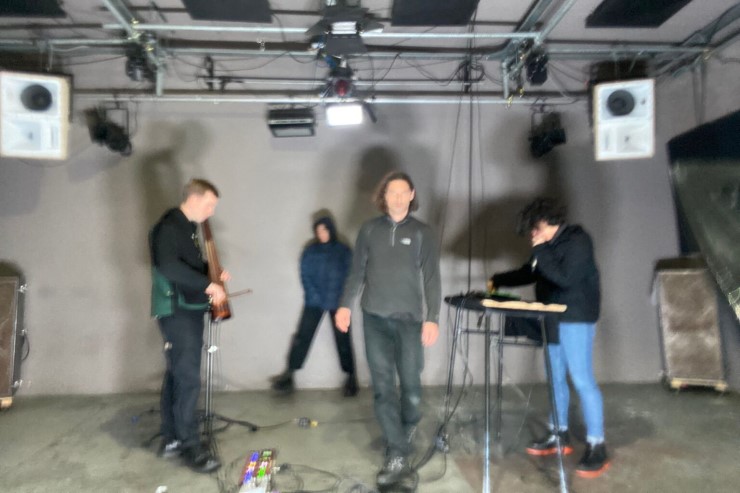Ahead of bringing their genre-bending audio and visual practice to the ACCA stage, Penumbra speak to Brighton Source on the synergy found in collaborative experimentation, the importance of having a balance of influences, and the power of taking performance on the road.
Penumbra are well-versed in the art of live improvisation, with vocalist Dali de Saint Paul, electronic composer and double bassist Maxwell Sterling, and visual artists Charlie Hope and Rebecca Salvadori each bringing their own understanding of what it means to experiment in real-time to the ACCA stage this month. We speak with Penumbra to hear more about their experience of working as an interdisciplinary quartet of independent artists, exploring their connection to continuity in the arts, and how the red hue of a room can help to shape sound, and frame performance.
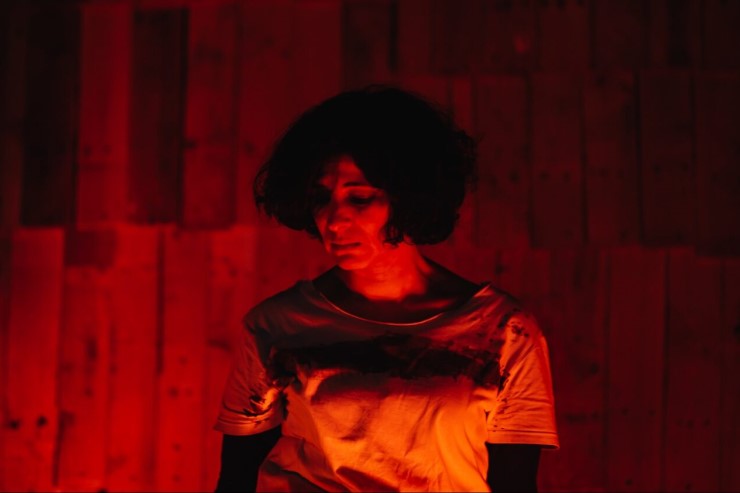
How did the collaboration between Lost Property, ACCA, Outlands and the artists lead to the creation of Penumbra?
Dali: Maxwell and I first collaborated earlier in 2023 when we were invited to improvise together on BBC 3’s Late Junction. We were really happy with the results (which you can now listen to as a release on the Accidental Meetings label). Outlands has a tradition of commissioning interdisciplinary work, so for this tour we invited the visual artists Rebecca Salvadori and Charlie Hope to collaborate with us to create this performance.
When it comes to experimental performance that aligns music with moving image, do you find you are more led by sound or vision?
Dali: I’m usually really guided by sound, but it’s true that here we have some luxury with Rebecca’s visuals and Charlie’s lights. I like the idea of them giving another interpretation each time, depending on the mood of our sound.
Maxwell: For me, each collaboration brings with it a different dominance of sound or visuals to be led by. However, with this project it feels like a really good balance of influence, some sounds have led to certain visual decisions, and vice versa. Taking this project on the road allows us to react differently for each performance – the red hue of a light in one room might be different to the next, Dali and I can then react or shape the sounds accordingly.
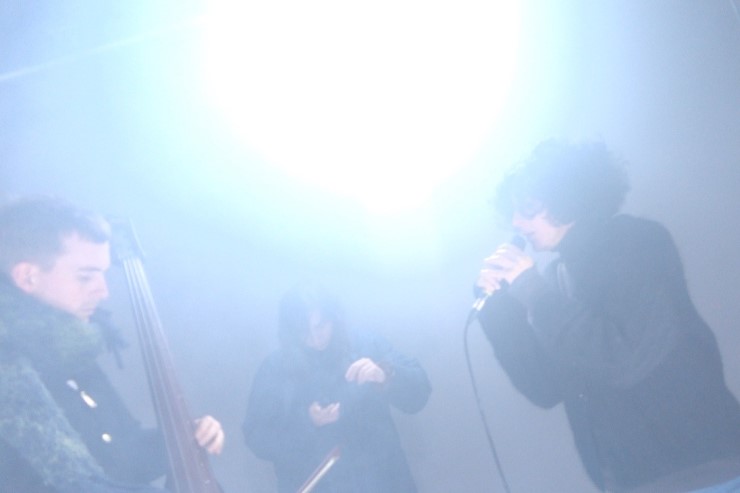
What is your co-creative process like as four independent artists working on one collective project?
Dali: It’s good! There are a lot of discussions around ideas that can evolve and feed one another. Being a part of a common creative process is exciting and demanding as you embrace other people’s ideas, and align with the music to make them alive through sounds.
Maxwell: For me, there’s a good amount of familiarity with Dali, Rebecca and Charlie as I have spent a good amount of time with them performing or talking. I find that this familiarity allows for a more natural yet deeper creative connection between us and something that is close to musical improvisation; conversational and free flowing.
Did your approach to improvisation and visual experimentation in the Late Junction session influence Penumbra?
Dali: The Late Junction session was our first encounter ever and this happened thanks to Silvia Malnati, who proposed we join forces for this session. At this time, I didn’t know Maxwell. Rebecca and I had briefly met Charlie but didn’t know his work. When we decided to work on the show together, Maxwell, knowing Rebecca and Charlie very well, suggested working with them. So then Maxwell and I sent them the music of the Late Junction session and maybe this music influenced their creation. Once we got together to practise in London, after multiple online meetings, Rebecca and Charlie saw us play and realised how organic our music is.
Maxwell: It was just Dali and myself that day at Late Junction, however I had recently played some performances with Rebecca and Charlie as part of Messengers so I felt there was a continuity to what I was doing with all of these individuals. Rebecca and Charlie definitely have an improvisatory approach to their work and this is very refreshing to engage with as a musician who enjoys improvising.
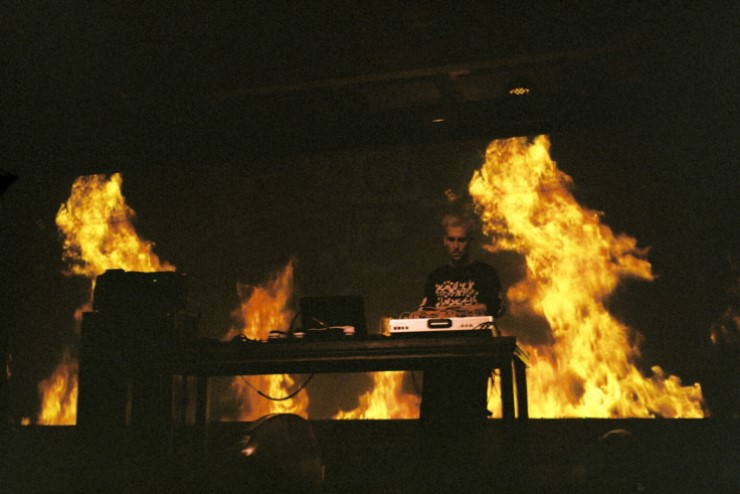
Is there a history or message behind the name ‘Penumbra’?
Dali: Penumbra came from a discussion about light emerging from darkness and the fact that we live in a world that is not just white or black. There is an inbetween. When we live in dark times, we all have to find a way out of this darkness. Penumbra invites us to think about this.
Maxwell: To echo Dali’s answer – I think our music contains something at once dark yet weirdly optimistic, something very visceral and human. This to me represents what Penumbra means.
Brighton has a reputation for its experimental cultural scene and ACCA is known for its ability to showcase sound with remarkable depth and clarity – do you feel a connection to this place?
Maxwell: It’s my first time performing in Brighton, although I have visited many times. I am very excited to be coming to ACCA and to experience the sound fidelity. As a performer, the difference a good venue and receptive audience make are massive.
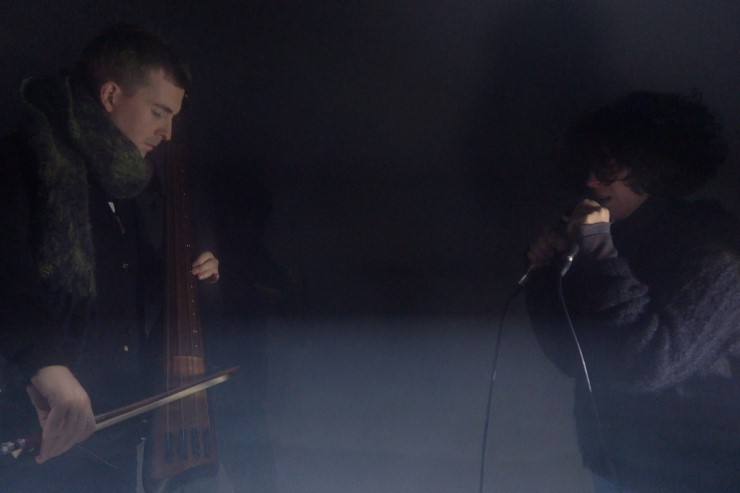
What are your hopes for the future of interdisciplinary performance and practice?
Dali: I think interdisciplinary performances are essential to give the audience a full experience: emotions are blocked and any media to convey them is good since each person feels differently and is touched by images, lights, sounds or words… I like to think we can offer an immersive performance and I’m hopeful that there will be more of these.
Maxwell: I believe all performance and practice is becoming more interdisciplinary. Younger generations seem to reject things that are of one discipline, of one media or fidelity. It’s quite exciting to see this happen right now; where we are technologically makes for incredibly interesting collaborations and results.
Penumbra play at the ACCA on Thursday 14th March 2024
More information here

